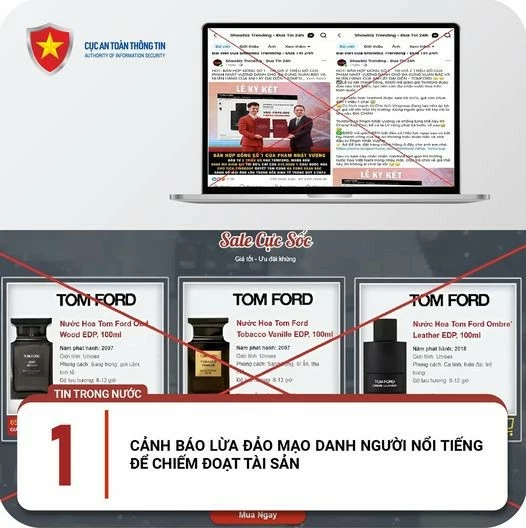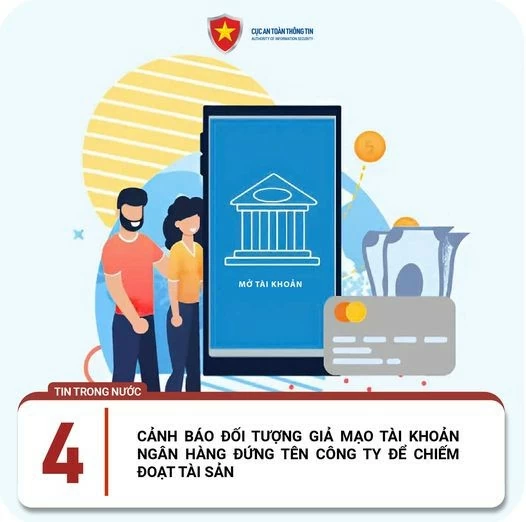According to the Information Security Department ( Ministry of Information and Communications ), online scams are becoming increasingly sophisticated and unpredictable, with perpetrators constantly changing and "transforming" their methods. People need to be more vigilant.
Therefore, simply raising awareness among users to identify and avoid each type of scam is not enough; more importantly, it is necessary to equip them with the skills to prevent and respond to scam situations. The Cybersecurity Department also stated that recently, impersonation scams have increased sharply.
Below are some recent scams that people need to be very aware of and equip themselves with the necessary preventative skills.
Impersonating celebrities to commit fraud.
 |
Recently, on social media, individuals have been impersonating many celebrities such as billionaire Pham Nhat Vuong, artist Xuan Bac, singer Toc Tien, etc., using their manipulated and edited images and information to spread false information, advertise low-quality products, and ultimately deceive and steal personal information and assets.
With the aforementioned methods of brand impersonation and celebrity fraud, the scammers employ the tactic of creating numerous sophisticated fake fan pages and websites with interfaces and domain names very similar to the legitimate sites.
To increase their credibility, scammers also create documents, advertisements, or products with the names and logos of reputable brands, and manipulate images of famous artists.
The Cybersecurity Department advises users to be cautious about posts and information from unknown sources on social media, and also recommends that users develop the habit of verifying the authenticity of information and sellers.
Consumers should also seek information about artists or brands on official websites or reliable sources to verify the legitimacy of advertised products, and avoid accessing suspicious links, downloading applications from unknown sources, and providing personal information.
Impersonating businesses to commit recruitment scams.
 |
Petrolimex, the Vietnam National Petroleum Corporation, and its member units have recently been repeatedly targeted by individuals impersonating them for fraudulent purposes.
A variety of scams aimed at defrauding job applicants include online recruitment, creating online orders, opening loan accounts, and impersonating gas station attendants.
In recent months, fraudsters have also been using impersonation tactics to scam recruitment, targeting major delivery companies such as Giao Hang Tiet Kiem, Vietnam Post , and Viettel Post…
According to the Cybersecurity Department, scammers often create fake websites with domain names similar to the company's official website; and use fake emails to send job announcements, interview requests, or requests for personal information.
They also illegally use images and information of businesses to post job advertisements for fraudulent purposes. In addition, these individuals demand fees from applicants and then steal the money.
The Cybersecurity Department advises workers to be wary of job offers on social media. They should access the official website or contact the company directly to verify recruitment information, and use business lookup services to verify the information about the recruiting company. If they suspect fraud, workers should immediately report it to the authorities or consumer protection organizations for assistance and resolution.
Warning about scams in international trade.
 |
The Vietnamese Trade Office in Pakistan has issued a warning to the Vietnamese business community about a new scam in international trade. The scammers open fake accounts impersonating real companies abroad, contact Vietnamese businesses with import/export needs, and use sophisticated and professional tactics to trick them into signing contracts and receiving deposits.
To gain the victims' trust, the scammers also forged documents such as copies of quality certificates and certificates of origin.
However, after receiving the deposit, the perpetrators embezzled the money and erased all traces of contact. The Vietnam Trade Office in Pakistan also reported that a Vietnamese business had fallen victim to this scam, losing $5,000 in deposit money.
Based on the above situation, the Cybersecurity Department recommends that Vietnamese businesses exercise greater caution when participating in international trade activities. Before conducting any transactions, businesses should carefully verify information about their partners and confirm the legitimacy of their business dealings.
During the transaction process, businesses need to ensure that all agreements and transactions are clearly documented in written contracts, and if necessary, they can even consult with professional international lawyers.
Fraudulently using bank accounts registered under business names to steal assets.
 |
Recently, the Gia Lai Provincial Police Investigation Agency issued a decision to initiate criminal proceedings and detain Luu Van Thai (born in 1985, residing in My Duc commune, An Lao district, Hai Phong) for the crime of "Fraudulent appropriation of property" in cyberspace.
Specifically, earlier, Mr. NK (residing in Binh Dinh province) received a phone call from someone who identified himself as Ky, working at a military unit in Gia Lai province, and needed to buy a large quantity of feed and piglets. When Mr. NK said he did not deal in piglets, Ky then asked him to order the pigs from "Khoa Dang 88 Mechanical Engineering Co., Ltd."
To gain trust, Ky even forged a money transfer order to Mr. K's account for a deposit of 715 million VND. Believing him, Mr. K transferred 378 million VND to the fake bank account of the perpetrator to purchase breeding pigs, only to have the money completely stolen.
In this type of scam, the perpetrators create bank accounts in the name of a company but then sell them to individuals in Cambodia to carry out fraudulent activities and steal assets. The perpetrators call victims, exploiting their individual needs to offer and entice them with surprisingly cheap or discounted goods compared to market prices.
To gain trust, the perpetrators use bank accounts registered under the names of legitimate, reputable businesses and companies to reassure victims that they can safely transfer money. In reality, these are fake accounts, illegally acquired. After the victims transfer the money, the perpetrators block all communication and then steal the funds.
In light of ongoing scams, the Cybersecurity Department advises citizens to exercise caution and thoroughly verify the information of bank accounts or shopping websites before making any transactions. Ensure you are dealing with a trustworthy source by checking the website address and official contact information.
Furthermore, users should exercise extreme caution when receiving offers that are significantly more attractive than market rates. They should also regularly update their passwords, enable two-factor authentication, and use strong passwords for their bank accounts. If they suspect they have been scammed, they should immediately report it to the authorities or consumer protection organizations for assistance, resolution, and timely prevention.






































![[Photo] Prime Minister Pham Minh Chinh attends the Conference on the Implementation of Tasks for 2026 of the Industry and Trade Sector](/_next/image?url=https%3A%2F%2Fvphoto.vietnam.vn%2Fthumb%2F1200x675%2Fvietnam%2Fresource%2FIMAGE%2F2025%2F12%2F19%2F1766159500458_ndo_br_shared31-jpg.webp&w=3840&q=75)





































































Comment (0)